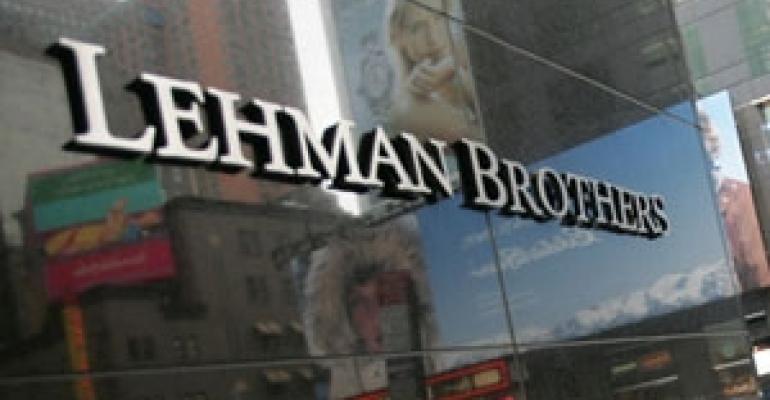With Equity Residential’s $1.325 billion bid for a 26.5 percent ownership interest in Archstone on the table, Lehman Brothers Holdings Inc. is preparing to fight back.
Lehman, currently run by restructuring specialist Alvarez & Marsal, has reportedly sought approval from a bankruptcy judge to bid $1.33 billion for the same 26.5 percent stake. Lehman, contractually, has the right to match any offer for Archstone. Its ability to fight may also be bolstered in coming months as its $65 billion bankruptcy liquidation plan, which was approved last week, moves forward.
The bankrupt financial services firm, which owns 47 percent of Archstone, contends that Equity Residential’s bid undervalues Archstone, which owns and operates nearly 50,000 multifamily units in the U.S. and Germany. Equity Residential’s offer is for roughly half of the collective interests owned by Archstone’s two other owners, Bank of America (BofA), which owns 28 percent, and Barclays, which owns 25 percent.
Green Street Advisors calculates the Chicago-based REIT’s bid to value Archstone at roughly $16 billion, representing a 5.4 percent nominal cap rate for assets on 2012 net operating income (NOI), according to Andrew J. McCulloch, a senior analyst with the Newport Beach, Calif.-based investment firm.
McCulloch estimates Equity Residential’s bid to be a slight discount of 3 percent to 5 percent to unlevered asset value (assuming current market cap rates of 5.2 percent and assigning $1.5 billion in value for all “other” Archstone assets including joint ventures, German assets, development pipeline and land.) The potential buyer’s offer does not assign any value to the Archstone operating and management platform.
McCulloch adds that Equity Residential’s pricing discount reflects Archstone’s above-market rate debt, as well as the risk associated with owning a non-controlling limited partner stake. It’s important to note that Equity Residential will not have any authority over the day-to-day operations of Archstone. Because its ownership percentage is greater than 25 percent, however, it does have approval rights over major financings, refinancings, acquisitions and dispositions.
A nonsensical deal?
To put Equity Residential’s offer in context, Lehman paid $22.2 billion for Archstone in 2007—at the height of the market. The investment firm partnered with Tishman-Speyer to take Archstone private in leveraged buyout deal that generated a huge amount of debate within the financial and commercial property industries.
At the time, the price represented a minimal premium to Archstone’s NAV and below the firm’s 52-week high. However, many analysts were against the deal, pointing to Archstone’s heavy debt load.

“When the deal was announced in May 2007, it didn’t make a lot of sense because the numbers did not work—the entity was bleeding money,” recalls Alexander Goldfarb, managing director with Sandler O’Neill + Associates, adding that the deal was a homerun for Archstone investors.
Yet it makes sense for Lehman to want to hold onto Archstone, says Edward Ring, founder and CEO of New Standard Equities Inc. and former executive with Kennedy Wilson Multifamily. While serving as COO of Kennedy Wilson Multifamily in 2007, he evaluated Archstone’s West Coast portfolio as a potential acquisition target and soon realized the pricing marked the top of the market.
“When Lehman and Tishman made the deal, it was a huge bet on the market at a time when the wheels fell off the financial bus,” Ring recalls. “For years it looked like the world’s worst purchase. But when you look at the industry today, it may have been a lot of money, but I’m not sure that Lehman didn’t end up paying a decent price.”
Ring points out that many of Archstone’s assets are either recently completed or fairly new. “I was thinking the assets would trade at a 5 [percent] cap at most if not a 4.85 [percent] cap,” he says. “While some would say that Lehman is trying to compete for their own properties – in some sense throwing good money after bad—it’s also the prudent thing to do to maximize value for their creditors and investors.”
Discounted for a reason
Analysts who have been closely following the Equity Residential bid say that determining the value of Archstone is difficult because, as a private entity, the firm has made limited disclosures since its buyout. Even so, analysts have taken a stab at valuing Archstone by looking at comparable publicly-traded apartment REITs.
Although Archstone’s U.S. portfolio has evolved since its privatization in 2007, it remains one of the largest and highest quality apartment portfolios in the country. It is concentrated primarily in high barrier-to-entry markets with roughly 80 percent located in coastal markets including Northern and Southern California and the Washington D.C. region. It also owns 15,000 units in Germany.
Current asking rents in Archstone's portfolio are roughly in line with the multifamily sector’s bellwether REIT, Avalon Bay Residential, and 30 percent higher than Equity Residential’s rents, according to Green Street Advisors. Using Avalon Bay’s net asset value as a benchmark, analysts estimate that Archstone’s NAV could be as high as $17.6 billion. When the operating and management platform is added, the company should be worth even more. However, the company’s ownership structure and debt load, do weigh it down. (Experts say Archstone is about 70 percent levered).
“If Archstone were a normally-capitalized entity, the value of the deal that Equity Residential has cut is probably to 10 to 15 percent less than what it would be worth in the marketplace,” Goldfarb says. “But that discount is there for a reason."

